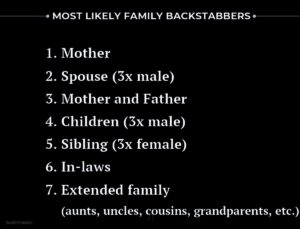Why is it important to know how to deal with a psychopath family member? Because it is on you to first protect yourself, and then those that you love from such toxic exposure. There is a reason we refer to predatory psychopaths as toxic. It is because being exposed to a toxic substance is poisonous.
Exposure to these poisons compromises your immune system and causes your body (mind and spirit) to deteriorate. It promotes premature aging, your propensity to acquire disease(s), and can lead to a decreased life span. Not to mention the other pain and suffering from exposure to predatory psychopaths and/or toxic people.
We already know that some family members are more likely to stab you in the back than others. They may not be full-blown psychopaths, they are definitely considered toxic and you should treat them the same way as a psychopath to protect yourself from further drama, pain, and abuse.
For most people, this is shocking. How could someone who I love and trust stab me in the back, like that? Yet, it happens every day. Probably not to you, because psychopathic family abuse visits less than 1 out of 10 people, and it’s difficult to talk about when it happens.
The most likely toxic family members who could be considered predatory and/or psychopaths would be (1) Mother, (2) Spouse (3 times more likely to be the male spouse), (3) Mother and Father (either/or), (4) Children (3 times more likely to be the male child), (5) Sibling (3 times more likely to be a female sibling), (6) In-laws, followed by (7) Extended family members (aunts, uncles, cousins, grandparents, etc.). Source: Trust Betrayal.
It is imperative that you take action at the earliest detection of being exposed to a toxic personality or predatory psychopath.
The first step, if you love them, and because they are family, you must clearly notify them that you desire personal space, isolation from that part of their personality that does not resonate with you. Gove them the opportunity to protect you from that part of themselves. Do not call them names or label them (do not use the word psychopath).
Think about phrasing it something, like this,
“You know, I have been having some health issues, and it is really important for my health to stay in a positive frame of mind right now. And some of the stuff that you are doing is not making me get better. I would appreciate it if you could help me out, and not do anything to add any stress or drama in my life right now.”
Let them respond in any way they see fit. Then continue,
“I don’t know if I have expressed myself clearly about how important this is to me. I hope you understand. I don’t want to not have you in my life anymore.”
If they have agreed to help look out for your best interests in this way, the next time you start to feel the slightest bit of pressure, you may politely interrupt them and say,
“Oh, I’m sorry,” (insert name) “This” (conversation/situation/circumstance, etc.) “is not working for me. Can we change the focus, right now?”
If they comply, you can stay. If they do not, excuse and remove yourself from the toxic person’s presence. If they follow you and pester you, keep going further away.
I know, right about now, someone raises their hand and says,
“But what about family holiday get-togethers, like Thanksgiving? I just hate being around the family psychopath!”
What can you do when you have to be in the same place as a psychopathic family member?
The best thing you can do is to change the way you think about your family psychopath. Stop participating and allowing your psychopathic family member to control you. If you feel sad, threatened, upset, disgusted, or angry when they are controlling your emotional state. This is a huge win for the psychopath. Do not give them the satisfaction.
Find a different way to think about them, detach yourself, and practice tolerance, meaning that you accept things as they are. Yes, this particular family member is a psychopath who loves to lie, manipulate, and control everything around them by making everybody think he or she is something that he or she clearly is not.
So, watch the whole thing play out in front of you as the observer, as if you are watching a sitcom or docudrama on television. Enjoy the show for what it is. Your family member is a psychopath. You can’t change that, just like you cannot change a frog into a bird, even though there are frogs that appear as though they can fly. Flying frogs are not birds, they never will be, so just enjoy watching them for the frogs that they are, observe their attempts to faux-fly, and stop judging them for trying to act like birds. Just let it be and enjoy watching them do what they do. Do not let them have influence over your normal state of mind.
And you might interject,
“But I get so upset! I just can’t stand to be around him, and I don’t want him to influence the rest of the family.”
If they honor your request for emotional space, you can be less affected. If a toxic family member will not respect you enough to give you the emotional (and physical) space you need and deserve, you must treat them just like you would any other psychopathic predator, regardless of any familial bond you may have. Period.
Just because you are family does not mean you have to allow other family members to disrespect or abuse you. This is your life, and you need to initiate boundaries wherever you need to in order to have the life you want. This is a clear boundary that needs to be set if they refuse to accommodate your requested parameters.
Follow the steps in the How to Deal with a Psychopath Video. You have to cut them off, which means no contact.
If cutting off a family member seems too extreme, you could attempt a confronting conversation, though be prepared if you do, for a process and outcome that is unbecoming, to say the least.
Even if you have avoided using the label “psychopath” (which you should never use when confronting a psychopath) in all your conversations, be aware that this conversation is going to go one of two ways: They will either play along with you, as they are scheming some retaliation plan to attack you or your reputation, which will appear to be very pleasant and respectful on the surface, or they will escalate the conversation by introducing drama, and raising their voice to overpower and take control of the situation. Be prepared for either, and stand by your truth without getting defensive or getting drawn into the conflict.
Think about starting new family traditions, hosting your own get-togethers, and not inviting the toxic predatory psychopaths to your familial events.
Expect withdrawal symptoms when removing toxic family members from your life. It may not be easy, and it may cause you to have second thoughts, questioning your decision, you might feel sad, guilty, or depressed. Know that some people will turn to substance abuse to take the edge off of the separation anxiety. Hopefully knowing that when the tendency arises will help you avoid the potentially addictive side effects of such a drastic method of initiating self-care.
Your safety comes first. You are doing the right thing for yourself and your loved ones.

